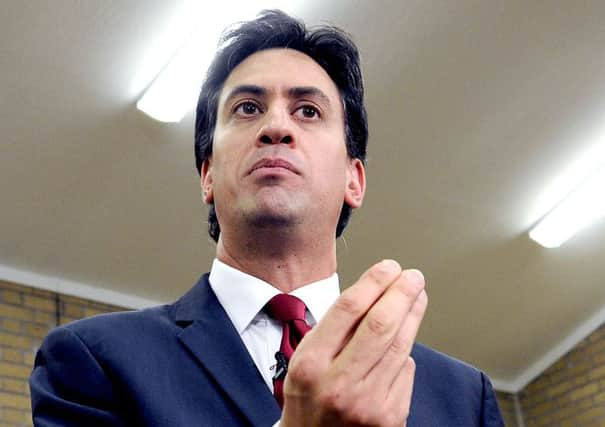Leaders: Time for some answers, Ed Miliband


The SNP surge in the polls since the independence referendum shows no sign of abating, and if replicated on 7 May will wipe most Scottish Labour MPs off the electoral map.
The result, somewhat predictably, has been Scottish Labour MPs turning on each other, and on their leaders, both Mr Miliband and the new Scottish leader, Jim Murphy.
Advertisement
Hide AdAdvertisement
Hide AdTo call this a civil war is perhaps doing it too much of a compliment. This is blind panic, with little discernible intellectual coherence.
It has manifested itself in arguments over where the party should concentrate its scarce financial resources, or if it should concentrate them at all.
This week’s constituency polls by Lord Ashcroft deepened the panic when it became clear the SNP surge was not limited to areas of Scotland where the Yes campaign did particularly well.
As this newspaper reported earlier this week, some MPs are urging the party to write off the chances of holding on to any of its seats in Glasgow and instead concentrate on the east-coast seats that are now deemed also to be at risk.
Some Labour MPs deduce that the problem is Mr Miliband’s reluctance to rule out a deal with the SNP, leading some voters to conclude a vote for the SNP will have the same result as a vote for Labour.
As some Labour insiders have acknowledged, the main difficulty here is that many of the party’s MPs never saw this coming. They witnessed the SNP’s Holyrood landslide in 2011, and the Yes vote’s 45 per cent in 2014, and failed to recognise this as a gathering wave. Scottish Labour MPs are the holidaymakers standing rooted in the shallows on the beach, wearing their water wings, watching the tsunami rise over their heads and blot out the clouds. Into this chaos now walks Mr Miliband, and there is a weight of expectation on his shoulders.
These days Scottish Labour is a far more autonomous party than it used to be. Although on funding, for example, it is still largely beholden to the UK party, in policy respects it has declared its independence, with Mr Murphy seemingly being true to his word that Scottish party policy will be decided in Scotland, with no veto from the UK leadership.
The problem, however, is that the contest in May is not a Scottish election. It is a UK election, and one of the key issues for Scottish Labour is the potential for a post-election deal between the SNP and Mr Miliband. As such, this is one crucial aspect of the Scottish political debate that is out of Mr Murphy’s hands.
Advertisement
Hide AdAdvertisement
Hide AdMr Miliband needs to set the record straight on his attitude to a deal with the Nationalists. It is not just his MPs who want an answer: the Scottish public needs to know as well.
Bank that likes to say yes – to itself
IT IS not only the Edinburgh tram that stops at Royal Bank of Scotland’s headquarters at Gogarburn – it seems the gravy train stops there as well.
How many times have we heard RBS senior management intone that the days of the give-away bonus culture were over, and that a bank in public ownership owed it to the taxpayers to show restraint?
It was said by chief executive Stephen Hester when he was clearing up the mess left by Fred Goodwin, and it was heard again when Mr Hester was replaced by Ross McEwan. Apparently, this was all just empty words, signifying nothing.
Yesterday it was announced that the bank paid 72 employees £1m or more in 2014 – exactly the same number as were given that size of bonus in 2013. The gravy train pulling in to Gogarburn is just as busy as it was.
What is all the more galling is that RBS did this while trumpeting that it was at the “leading-edge of reform” on reducing banker remuneration.
The kindest thing to say about this claim is that it does not appear to be fully rooted in the soil of truth. There are less kind alternatives that will no doubt come readily to readers’ minds.
Sandy Crombie, chairman of the RBS’s group performance and remuneration committee, was yesterday quoted as saying: “The committee must balance the views of our stakeholders with our duty to reward our people fairly, and our responsibility to ensure we are running a commercial business with the best available talent.”
Advertisement
Hide AdAdvertisement
Hide AdA commercial business, yes, but one that is 80 per cent owned by the government.
When will RBS learn that it now answers to the taxpayer?
FOLLOW US
SCOTSMAN TABLET AND MOBILE APPS